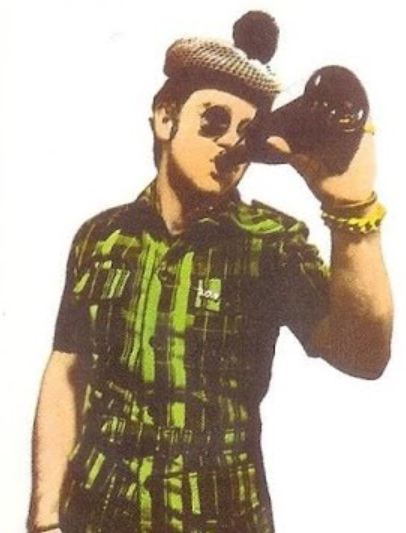I’ve been curious how many working researchers we’ve got in this community, and what you all do!
If you’re working in science (physical or social), engineering, etc in a research capacity, give a shout in the comments and let us know what you work on! Same goes for students and amateur scientists at any level. (And by amateur I mean those of you who are working on your own experiments but just not being paid for it / not working on a degree; I’m upset that “amateur” has a negative connotation, it shouldn’t.)
I’m currently a PhD candidate, working on transmission electron microscopy and electronic materials (mainly ferroelectrics). In the past I’ve been involved in research / product development in a few different industries, including medical devices, aerogels, and materials for RF devices.

It’s science-y enough but I’m definitely not considered a scientist so much as a technologist. I work as a MRI (Magnetic Resonance Imaging) Technologist. Previously a X-Ray Technologist.
My machine does all the science for me but it’s a pretty neat concept. Using magnetic gradients and RF pulses at hydrogen protons to acquire accurate digital imaging.
Happy to have you! The science behind MRI is fascinating, and the machines themselves are really cool. Have you ever seen a magnet quench? I don’t think they’re really supposed to happen during normal operation, but some of the videos I’ve seen have been rather dramatic.

It is pretty crazy people were able to figure that all out and we are able obtain crazy detailed pictures without radiation.
No I haven’t seen it! Hoping to see a controlled quench someday but also hoping to avoid needing to use it in any emergency situations; it’ll have to be a damn near life/death situation to hit that button. Very costly decision. I guess there’s also a dwindling supply of helium in the world so that could get interesting as time goes on.
Yeah, helium being a finite resource was something that really surprised me when I first learned about it! Better to keep it inside the MRI as much as possible for sure

helium recovery and recycling has come a long way, and the costs of helium are now justifying the extra expense of the hardware, so I think that problem should abate somewhat in the coming years.

I’m a PhD candidate too - my contract is finished now, but I am still writing my thesis. So I am currently at the awkward intersection of finishing a thesis and looking for a job.
My PhD focus is in applying time-resolved spectroscopic techniques to study the excited state dynamics of molecules. Basically, these are experiments in which a pulsed laser is used to excite the sample and a second probe light is used to measure a change in the absorption in response to the light. By measuring these changes in the absorption as a function of time, and applying quantum chemical methods to calculate the spectra of potential intermediates, one can sort of recreate a movie of what the molecule is doing after it absorbs light with a time resolution of femto to picoseconds. The materials that I study are organic dyes that are useful for microscopy, as well as molecules that respond to EUV light for applications in photonanolithography (for making the very small transistors in computer chips).
I am also an “amateur” scientist when it comes to biology, as many of my hobbies are nature-based and it’s not like I can turn off the science bug when it comes to hobbies.
Well that’s fascinating! The technique sounds a little bit like a cross between Raman and EXAFS/XANES? (Probably just because those are two techniques I happen to be familiar with though.)

Raman and EXAFS/XANES are techniques to probe different types of molecular transitions. Vibrational raman probes molecular vibrations, and XANES probes electronic transitions due to excitation of core electrons. Each technique will help you obtain different molecular properties. The standard approach is to apply these methods to do “static” absorption studies, meaning that one studies the transitions induced by these light sources in order to obtain molecular information of a given sample. The time-resolved techniques expand these measurements along the time dimension, so you can measure these properties but in a sample that is changing extremely quickly in response to a trigger (usually light).
So, it is not that the technique is a cross between these, but rather an approach to take Raman, or XANES, or IR-spectroscopy, or UV/Vis absorption spectroscopy, and then apply it in a time-resolved manner. You can usually take any spectroscopy technique and add “time-resolved” at the beginning and you will find someone doing that. Of course, some techniques are easier to perform in practice than others. I have done some time-resolved XANES experiments, and for those we need to go a synchrotron and the experiment is really tricky. A time-resolved UV/Vis can be done in many university labs. I don’t have practical experience with Raman experiments.
That’s a really clear explanation, thank you!

I’m a research professor of neurology, and my research focuses on developing novel cognitive assessments for measuring early-stage Alzheimer’s disease and other types of dementia.
That’s a field where it seems (to an outsider) like a lot has been happening recently! Glad to have you here!

You’d be correct! The new anti-amyloid drugs are very exciting, and it makes my work on preclinical Alzheimer’s even more fulfilling as it can have a real impact on getting people tested and treated as early as possible.

I work at a company that makes large and small rocket engines (e.g., the ones on SLS/Artemis, and solids for a number of defense programs), and various electrical power systems (e.g., for the ISS and some of the Mars rovers). I manage the space software engineering organization.

Look at this rocket surgeon, over here. SMDH.

I’m just a software/systems guy; I work with a lot of genuine rocket scientists - they’re fun to work with.
Oh wow, that’s fascinating! I imagine you have to be very careful with software reliability for that kind of project?
It looks like you’ve already found the space community as well! (But for anyone else who might not have: https://beehaw.org/c/space)

I work in mine closure. I create plans to re-integrate them back into the surrounding landscape, and provide valuable end land uses (not just those centred around ecosystem re-establishment).
That’s so cool! Sounds like an incredibly rewarding job. (Also I love visiting old mines that are no longer working but are open to the public for viewing. Always a cool experience.)

Development engineer working with autonomous vehicles.
Worst part of it is having to interact with Tesla bros who think that they have self-driving figured out despite what experts in the field tell them.
Best part of it is being able to code functionality then sit down inside an actual physical vehicle and see, hear, and feel it act out what you programmed. Incredibly satisfying.
That’s does sound satisfying!
I’m pretty thankful that I’m not in a field that gets too much public attention. I think people mostly think of electron microscopy as a bit like magic. I can imagine the kinds of interactions you might have; everybody knows how to drive a car, after all, so why can’t you just program it to do what they do?!
That said, I’ve got some ideas for how to… (/s)

@realChem @Pelicanen they say all electrons are alike. I guess after you looked at one real good, you’ve seen them all? ;)

working in a cultivated meat startup, msc in biotechnology, but now disillusioned and wanting to do something academic/more down to earth and helpful
If it’s not too personal, may I ask what lead to your disillusionment with the field? “Lab grown” meat (assuming that’s what you mean by cultivated) has seemed like a promising idea to me for a while, in terms of environmental impact and the ethical consideration of animals.

That doesn’t feel helpful to you?

no, the technology is underdeveloped, and very resource intensive. I don’t think it is a viable alternative at all. Better to just eat what grows from the ground than spend so much time, money, energy forcing cells that don’t want to grow in such an artificial environment. I’ve also started to notice how it seems to be quite tied to EA and longtermism crowd, who are investing in it a lot.

True. It could still have benefits from a vegetarian or conservation perspective, though.
Have you thought about trying to get into genetically modified plant crops, then?

I did consider it yes, but those companies are evil too, they make a farmer reliant on a super crop that can’t produce its own seeds, and then make a mint by selling them seeds every year.

@realChem I retired from being a chemical engineer in the environmental remediation of hazardous wastes and petroleum. Went sailboat cruising, and stopped along the way to teach high school chemistry four years. Now I volunteer with OpenAir Collective working on CO2 removal (from atmosphere, not point sources - later is called “capture” instead of “removal” for some reason). Without chemicals, nothing would exist!
I actually did chemical engineering as my undergrad degree! I didn’t work directly on any remediation projects, but one of the first jobs I had involved making sure all the waste our plant produced was properly treated. It was a slurry, I was helping to separate all of the solids and then neutralize the remaining liquid, and then it went on to Clean Harbors for final treatment.
Your whole post-career honestly sounds ideal, I hope to do something similar. I’ve always wanted to teach, but after I retire and don’t need the money.

I’m a staff bioinformatics scientist at an academic institution, got my PhD a few years ago and wasn’t interested in a postdoc. I get to work on a huge range of research questions and lots of different technologies. It’s great!
Oh that’s rad! What’s it like being a staff scientist at an academic institution? I’m still trying to figure out exactly what I want to do after I graduate – I know I’m not interested in pursuing the tenure track, but I haven’t decided if I should go back into industry / look into staff science positions national labs / etc.

It has its pros and cons — I work on lots of projects and help with parts of grant writing, but I’m not the one guiding the big research goal/question (I appreciate that the questions are interesting but don’t care that much about the question usually). Because I work on so many projects I usually only have <1 full day a week to work on each one, so progress can be slow and managing expectations can be challenging. I am paid more than a postdoc but less than I would in industry. It is expected that I will mentor undergraduate students and teach workshops. These things might make a big difference re: how much you enjoy the job. Folks in this type of position are sometimes called research software engineers: https://society-rse.org/
Huh, that’s really interesting. I do like teaching, so that part sounds appealing (as does getting paid more than a postdoc!), so maybe it’s a route I’ll consider going forward. Thanks for your insight!

Sounds cool, do you have any tips on what kinds of skills you need for a bioinformatics position? I have a background in biology, but some CS knowledge I have learnt myself, programming (unfortunately mainly python for now), linux, deploying stuff with docker, etc.

This all sounds like a solid start tbh, if you learn pandas and bio python i feel like you are basically there

I’m a professor of chemistry, I mainly do organometallic research but we’ve been branching out into other areas.

@sensibilidades @realChem MOFs are hot
Very cool! My only experience with organometallics is with CVD and related technologies (like we’ve got one machine we use called a FIB – focused ion beam – that uses an organometallic as a carrier for platinum deposited as part of the process). Mainly I think of them as “probably toxic, probably pyrophoric, treat with extreme caution” sorts of chemicals.

I’m a software developer who works on Backend/APIs/Cloud/AI.
Currently browsing Lemmy instead of actually doing work in my home office…
Currently browsing Lemmy instead of actually doing work in my home office…
Some days just turn out that way lol

I’m an associate professor in computer science, currently working on stochastic algorithms (like genetic algorithms).
Until now, I’ve been working on quite abstract optimization problems, but I’d like to switch to more useful applications, like social inequalities or climate change.
I get that. Working on a more abstract problem should, in theory, help solve more practical problems down the line, but sometimes it just feels less satisfying that working on something where you can see the real world application and (hopefully) results. I’m definitely looking to do something practical with my experience once I’m finished with my PhD.

PhD in Geology. Now am a research scientist working in more general materials science/chemistry/gas adsorption. My thesis was on lunar petrology where I studied Apollo 16 samples. My current research is much less exciting. Haven’t touched a rock in ages and my geologist heart hurts from it haha
Dang we gotta get you some cool rocks!
(I’ve always kinda wanted to thinly section some rocks with nice big grains and put them in the TEM; so many natural minerals have really interesting crystal structures!)

I’m a PhD candidate in inorganic and biochemistry! Loving the chem representation here, and loving OP’s username.
Haha thanks, I appreciate it!

PhD candidate, archaeologist in a physical geography department. I read dirt to reconstruct ecosystems over time.
That sounds like a really interesting field! I can’t even begin to imaging all of the complexities but the basic idea you put forward (“read dirt to reconstruct ecosystems over time”) is very compelling.

